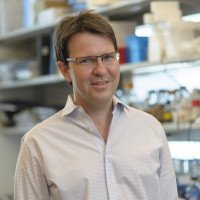The Hans-Guido Wendel Lab
Research

Our goal is to develop new cancer therapeutics and we are curious to identify biological vulnerabilities in cancer cells that provide opportunities for attack. Our research explores the molecular and cellular changes that drive cancer cells and ways to create new types of therapeutics including small molecules, engineered immune cells, and antibodies.
We focus on deadly forms of lymphoma and specific areas of interest include: (1) the biology of immune receptors that control lymphoma growth and shape the microenvironment; (2) oncogenic RNA translation programs; and (3) epigenetic and transcriptional changes that govern the biological and clinical behavior of lymphoma and other cancers. We are guided by the mutational evidence in human cancer that flags critical pathways and processes and we use cutting-edge molecular tools to define underlying mechanisms. We use unbiased CRISPR/CAS9 screens to identify strategies of disrupting cancer drivers and we test our new therapeutic ideas in primary patient xenografts and genetically engineered lymphoma models.
We are always looking for talented trainees at all levels. See Career Opportunities for details and requirements.

Featured News



Publications Highlights
The Oncogenic Action of NRF2 Depends on De-glycation by Fructosamine-3-Kinase. Sanghvi VR, Leibold J, Mina M, Mohan P, Berishaj M, Li Z, Miele MM, Lailler N, Zhao C, de Stanchina E, Viale A, Akkari L, Lowe SW, Ciriello G, Hendrickson RC, Wendel HG. Cell. 2019 Aug 8;178(4):807-819.e21. doi: 10.1016/j.cell.2019.07.031.PMID: 31398338
Loss of the HVEM Tumor Suppressor in Lymphoma and Restoration by Modified CAR-T Cells. Boice M, Salloum D, Mourcin F, Sanghvi V, Amin R, Oricchio E, Jiang M, Mottok A, Denis-Lagache N, Ciriello G, Tam W, Teruya-Feldstein J, de Stanchina E, Chan WC, Malek SN, Ennishi D, Brentjens RJ, Gascoyne RD, Cogné M, Tarte K, Wendel HG. Cell. 2016 Oct 6;167(2):405-418.e13. doi: 10.1016/j.cell.2016.08.032. Epub 2016 Sep 29.PMID: 27693350
RNA G-quadruplexes cause eIF4A-dependent oncogene translation in cancer. Wolfe AL, Singh K, Zhong Y, Drewe P, Rajasekhar VK, Sanghvi VR, Mavrakis KJ, Jiang M, Roderick JE, Van der Meulen J, Schatz JH, Rodrigo CM, Zhao C, Rondou P, de Stanchina E, Teruya-Feldstein J, Kelliher MA, Speleman F, Porco JA Jr, Pelletier J, Rätsch G, Wendel HG. Nature. 2014 Sep 4;513(7516):65-70. doi: 10.1038/nature13485. Epub 2014 Jul 27.PMID: 25079319
People

Hans-Guido Wendel, MD
Member/Professor, Cancer Biology & Genetics Program, Memorial Sloan Kettering Cancer Center
- Cancer biologist Hans-Guido Wendel pursues both disease-centered and basic discovery research. The disease focus is on lymphocyte malignancies and the basic science arm of the lab explores fundamental mechanisms that control aberrant mRNA translation programs in cancer. Work in these two research areas frequently intersects in surprising ways.
- Medical School of the Technical University of Aachen, Germany
- Medical School of the University of Edinburgh, UK
- Residency in Internal Medicine, University of Aachen, Germany
- Postdoctoral Research, Cold Spring Harbor Laboratory
- wendelh@mskcc.org
- Email Address
- 646-888-2526
- Office Phone
Members
















































Achievements
- National Cancer Institute “Outstanding Investigator Award”
- Winner Glaxo Smith Kline Discovery Award
- Member, American Society for Clinical Investigation
- Scholar of the Leukemia and Lymphoma Society
- Scholar of the American Cancer Society
- Discovery of of protein glycation as a new post-translational mark that controls oncogenic NRF2 (Cell 2019)
- Generation of CAR-T cells that produce anti-tumor proteins (“Micro-pharmacies”) (Cell 2016).
- Identification of the HVEM – BTLA interaction as a major failsafe mechanism against lymphoma development (Cell 2016).
- Characterization of the key epigenetic regulators in lymphoma biology (MLL2/KMT2D and CREBBP/EP300) (Nature medicine 2015, Cancer discovery 2016).
- Identification of an eIF4A dependent mechanism that controls the translation of G-quadruplex containing mRNAs including oncoproteins (Nature 2014).
- Generation of a cell engineering strategy to enhance the safe use of stem cells for therapy (Cell reports, 2014).
- Identification and therapeutic delivery of the soluble tumor suppressor EphA7 in lymphoma (Cell 2011).
- Identification of MNK kinase as a cancer drug target (Genes & development 2009).
- Identification of the oncogenic action of the eIF4E translation factor (Nature 2004)
- Development of a rational combination therapy for high-risk follicular lymphoma (Journal of experimental medicine, 2014).
Open Positions
To learn more about available postdoctoral opportunities, please visit our Career Center
To learn more about compensation and benefits for postdoctoral researchers at MSK, please visit Resources for Postdocs
Career Opportunities
Get in Touch
-
Lab Head Email
-
Office Phone
-
Lab Phone
Disclosures
Members of the MSK Community often work with pharmaceutical, device, biotechnology, and life sciences companies, and other organizations outside of MSK, to find safe and effective cancer treatments, to improve patient care, and to educate the health care community. These activities outside of MSK further our mission, provide productive collaborations, and promote the practical application of scientific discoveries.
MSK requires doctors, faculty members, and leaders to report (“disclose”) the relationships and financial interests they have with external entities. As a commitment to transparency with our community, we make that information available to the public. Not all disclosed interests and relationships present conflicts of interest. MSK reviews all disclosed interests and relationships to assess whether a conflict of interest exists and whether formal COI management is needed.
Hans-Guido Wendel discloses the following relationships and financial interests:
No disclosures meeting criteria for time period
The information published here is a complement to other publicly reported data and is for a specific annual disclosure period. There may be differences between information on this and other public sites as a result of different reporting periods and/or the various ways relationships and financial interests are categorized by organizations that publish such data.
This page and data include information for a specific MSK annual disclosure period (January 1, 2024 through disclosure submission in spring 2025). This data reflects interests that may or may not still exist. This data is updated annually.
Learn more about MSK’s COI policies here. For questions regarding MSK’s COI-related policies and procedures, email MSK’s Compliance Office at ecoi@mskcc.org.